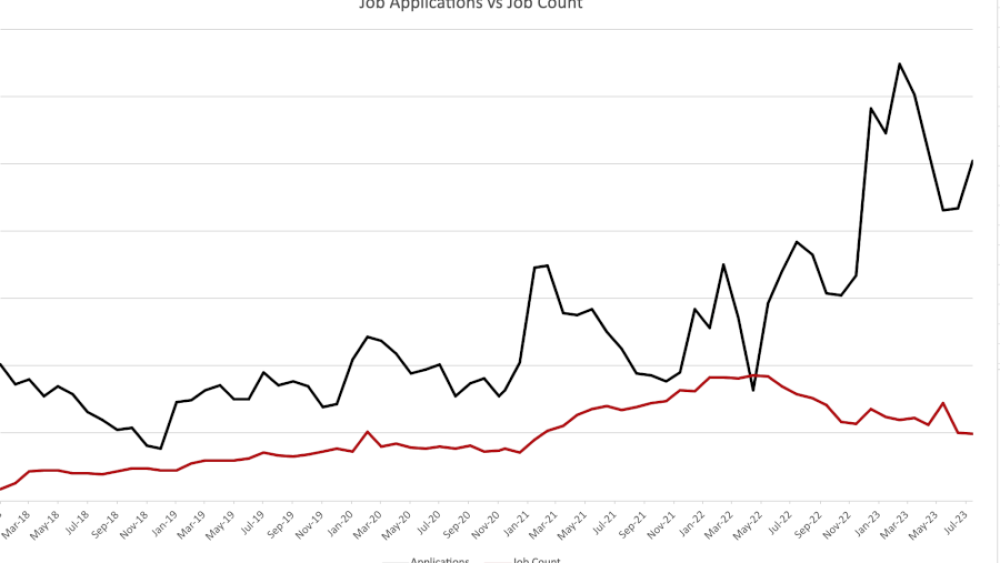In a cooling job market, companies often can’t match job seekers’ expectations on factors such as salary and remote work.
Pictured: Two people talking in an office/iStock, SeventyFour
In a cooling job market, companies often can’t match job seekers’ expectations, according to a BioSpace survey of 144 biopharma employers conducted in late September and early October.
More companies reported layoffs in the third quarter of 2023 than in any other quarter so far this year, with the number of job postings dropping 29% from Q2 to Q3, the survey found.
“It’s a tighter market than earlier in the year,” said Mike Silverstein, managing partner at Direct Recruiters. “There are more candidates in the market and less demand for their services.”
Higher Salary Expectations
Candidate salary expectations are too high, according to 57% of recruiters surveyed.
The Consumer Price Index, a measure of the average change over time in prices paid by urban residents for consumer goods, has risen by 3.7% over the last 12 months, according to the U.S. Bureau of Labor Statistics. The increased cost of living might be one reason why job seekers are asking for more money than life sciences companies can—or will—offer.
However, Silverstein suggested there are other reasons why candidates are asking for more money.
“In ‘21 and ‘22, there were a ton of companies hiring, so it was a good time to be a candidate,” he said. “If you had strong experiences, you could garner three, four, or five offers at one time.”
The number of biopharma job ads posted on BioSpace climbed throughout 2021, peaking in the first half of 2022 before beginning to fall. The number of job ads posted last month was 36% lower than in September 2022, unpublished data reveal. Companies were on the hunt for available talent, with many open positions and fewer qualified people to fill them, BioSpace’s 2022 State of the Recruitment Market found.
Pictured: A graph of changes in the numbers of biopharma job ads and job applications on the BioSpace website over time/BioSpace
That’s no longer the case, but “Unfortunately, the candidates’ expectations are still what they had been one or two years ago,” Ginger Auchter, director of scientific talent at Carex Consulting Group, told BioSpace.
Auchter points to candidates’ research as one reason salary expectations are high.
“Candidates as a whole are much more cognizant about what the market looks like” than in the past, she said. “They’ve done the research and have looked at different salary tools.”
Recruiters also state that employers’ hiring budgets remain an issue. Silverstein said that some companies may have overspent and over-hired in the past couple of years, causing budget rollover challenges.
“Companies are being pushed to save costs, and unfortunately, one of the easiest ways to have significant cost savings is on salaries,” Auchter said. At the same time, “I wouldn’t say [candidates’] expectations are significantly out of line—we’re still able to find a middle ground between employers and candidates.”
Both Auchter and Silverstein point to a supply and demand issue in the industry. With fewer jobs and more qualified candidates, salary expectations can be a deciding factor.
“If two candidates have an identical fit, a company is likely to bring in the person who is asking for $20,000 below another candidate,” Auchter said.
A Disconnect on Remote Work
At a time when many employers are asking for employees to return to the office, 40% of talent acquisition teams cited concern that candidates are only interested in remote roles.
Candidates “want to be able to have that true work-life balance where they can adjust and do the things that they need to do and not have to have that intense commute,” Auchter said.
Many people enjoy the flexibility of remote work, Silverstein said, but the desire for remote-only roles also speaks to broader economic issues.
“Childcare is expensive, gas is expensive,” he said. “I think people miss the camaraderie of being in the office, but I think when you can save a percentage of your annual income by just not going into an office, that’s appealing.”
Many jobs in the life sciences industry can be completed remotely, including marketing, product management and customer success. Still, other jobs in the industry make a remote arrangement difficult, such as research and development roles in which hands-on work and collaboration are critical.
“Obviously, it’s impossible to uproot a lab and bring it home with you,” Auchter said. “We’ve not seen much change in terms of people being able to do lab-based roles remotely.”
Q4 and Beyond
“I would expect Q4 and the beginning of next year to look similar to what it does now,” Auchter said. “I anticipate that we’re going to see even more constraint when it comes to salaries.”
Auchter said that companies are watching the economic climate, protecting their budgets, and making sure that they aren’t over-hiring.
“There’s still hiring going on, but [the position] has to be both urgent and a critical need,” Silverstein said.
Companies hiring now can improve their success in finding the best candidates by maintaining transparency, Auchter said. Companies with the most successful hires are those that reveal factors such as salary, growth opportunities and role expectations in the first interview.
Silverstein said that companies looking to hire the best candidates during this time must focus on building career growth opportunities for candidates and offering hybrid work schedules.
For candidates currently job hunting, Auchter recommends being mindful that posted salary ranges on public sites such as Glassdoor can be more than a year old and not representative of the current market. It’s wise to ask companies what their budgeted range for a position is during the interview, and make sure to ask about bonuses, profit sharing and equity, she said.
“Learn what goals and expectations your manager has for the role six months and 12 months down the road and clarify details about it,” she said. “Make sure it lines up with the goals you have both in the next position you take and in areas such as your work-life balance.”
Looking forward, “I think 2024 is going to be good, and we are seeing good indicators of this,” Silverstein said. “Life sciences is a big business, and if companies have access to capital, they are going to continue to grow.”
Hayley Shasteen is a freelance science writer based in northeastern Ohio. You can reach her at hayleyshasteen@gmail.com, or follow her on LinkedIn.






